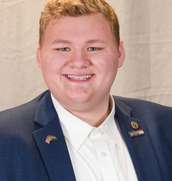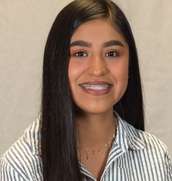 Two Westwood High School students were selected in the 2019 Junior Achievement 18 Under !8 awards in Arizona.
Two Westwood High School students were selected in the 2019 Junior Achievement 18 Under !8 awards in Arizona.Colton Cagle has found the value in volunteering. A senior at Westwood High School, Colton’s extracurricular work with the Rotary Club has proven to be among the most impactful on his young life.
As a freshman, Cagle got involved with Interact, which is the youth branch of the Rotary club. There, he learned about the organization’s service projects in Arizona and beyond, particularly its primary initiative of eradicating polio.
Cagle is the governor for his district of Interact – it covers the northern two-thirds of Arizona – and also leads local initiatives such as the annual Purple Pinkie project, which raises money for polio vaccines throughout the world. Through Interact, Cagle was one of seven students from Arizona that made a trip to Kenya to deliver mobility devices (braces, walkers, wheelchairs) to medical centers, schools and villages.
“Here with our club, we set up a table/booth at lunch for two weeks and we have kids donate a dollar,” Cagle said. “That provides three polio vaccinations, and that’s matched by the Bill and Melinda Gates Foundation and our Rotary Club. I love this project in particular because we think that because we aren’t financially stable, we can’t make an impact. But this project shows that donating just a dollar – a small amount – can make a huge impact.”
This year, Cagle and his team brought in $1,200 from Westwood’s Purple Pinkie drive.
Cagle is taking a gap year and traveling to the Netherlands for an exchange program. While overseas, he’ll learn a new language and a new culture, while doing service leadership projects. He plans to attend college when he returns to the United States.
“Kids are asked what do you want to do? What do you want to be? We’re constantly changing and learning. And I’m keeping it open,” Cagle said. “I don’t want to lose what I’m passionate about.”

When the topic is our nation’s southern border and immigration, it seems no one is without an opinion. For Priscila Romero Guevara, it’s a subject that hits very close to home, which is why she wants to devote her life to education and aid.
“I come from a family with mixed status and low socio-economic status,” she said. “Some of my family members are citizens, and others are not. Having relatives and seeing what’s going on in everyday life has really inspired me. I want to speak up, not just for myself but also for women.”
A senior at Westwood High School, Romero Guevara plans to study political science and transporter studies (a curriculum that mixes immigration and economic study) through a scholarship at Arizona State this fall. She’s the first person in her family to graduate from high school. When thinking about why education matters, she turned to a Nelson Mandela quote.
“He said that education is the most powerful weapon that you can use to change the world, and I strongly believe this,” she said. “I can fight for issues I deeply care about, find out about my roots.” Romero Guevara’s passion also extends helping the marginalized in many ways, particularly with civic duty. She’s committed to helping empower women and helping them achieve freedom – whether that’s through education, financial independence or some other achievement.
“There’s a lot of hatred toward women,” she said. “I don’t like the stereotypes about women – that a man needs to help a woman succeed. It’s led me to involvement in several organizations, where I’ve started to speak up not just for myself but also for oppressed women.”
When Romero Guevara looks at her family, she feels an immense pride but also a great duty. As the oldest of four children, she says a lot is expected of her. She also says that she feels obligated to give back and help. “Coming from a mixed status family is a lot more complicated than people think,” she said. “There’s a lot of pressure having relatives and seeing these societal problems in everyday life.
But it’s inspired me for a career, too. I know I want to work for an organization that helps women and also the immigrant culture.”

